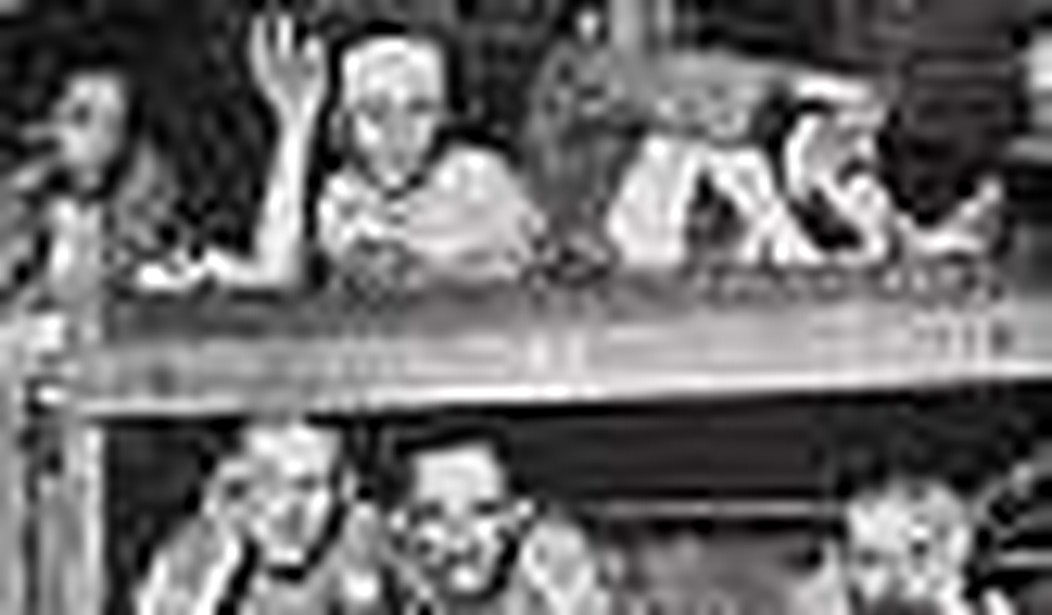“Conceptions of the Muslim as Enemy — Conceptions of the Jew as Enemy.” This was the title of a conference held on December 8 at Berlin’s Center for Research on Anti-Semitism. The stated aim of the conference was to employ the template of anti-Semitism in order to analyze an allegedly new form of kindred prejudice: “Islamophobia.”
The announcement of the conference sparked a raging controversy in Germany. It has been all the more intense due to the fact that the Berlin-based center is the most well-known and influential research institution of its kind in Germany and, arguably, in all of Europe. The Berlin center played a leading role, for example, in the development of the European Union’s much-cited “working definition” of anti-Semitism. Critics like journalist and author Henryk Broder and the political scientist Matthias Küntzel have charged the Berlin center with, in effect, abusing its prestige in order to relativize anti-Semitism and obscure the real threat of Islamic extremism.
The fact that Küntzel published some of his criticisms in English in the Wall Street Journal undoubtedly placed the Berlin center and its director Wolfgang Benz under greater pressure to respond. Küntzel’s criticisms in the WSJ were, however, very much hedged with politically-correct obbligatos. (For example: “It is certainly necessary to oppose the demonization of Muslims and discrimination against them, which often have racist motivations. The Berlin center, whose research covers prejudices in general, is right to address this issue.”)
The actual German debate has been much more of a gloves-off affair. Thus, for example, Broder observed:
Of course, you can compare everything and anything. You can compare Cologne to a city, the [German media prize] the Bambi with the Oscar, a currywurst with a delicacy, or even academic “Anti-Semitism experts” with bean-counters. But to mention anti-Semitism in the same breath as Islamophobia is as off-base as talk of “chicken concentration camps” to refer to ordinary chicken farms.
(The expression “chicken concentration camps” [Hühner-KZs] is in fact commonly employed by German “animal rights” activists.)
“There are hundreds of phobias,” Broder continued, challenging the pertinence of the comparison:
These include such highly original ones as “alliumphobia” — the fear of garlic; “babushkaphobia” — women’s fears or aversion vis-à-vis their grandmothers; “eurotophobia” — the fear of female genitalia; and “glucodermaphobia” — fear of the film that forms on warm milk when it is left standing for too long. Persons who suffer from phobias avoid what they fear. They don’t take the elevator, don’t go out onto public spaces, and steer clear of reptiles. An anti-Semite, on the other hand, feels compelled to seek contact with the object of his aversion. Anti-Semitism is not a phobia, but rather a kind of psychotic obsession. … The director of a Center for Research on Anti-Semitism ought to know that.
Reacting to the criticisms in a variety of venues, Benz insisted that as “prejudice researchers” it is normal that the members of the Berlin center would turn their attention to other forms of prejudice like “Islamophobia.” This raises the obvious question why the center is called precisely the “Center for Research on Anti-Semitism” and not rather the “Center for Research on Prejudice in General.” (Asked during a panel discussion that closed the conference [German audio available here] whether it would not in fact be more sensible henceforth to employ something like the latter name, Benz said that he was “energetically” opposed to such a suggestion. Other than to note that anti-Semitism was part of the Berlin center’s “brand name,” however, he did not explain why.)
But Benz’s repeated allusions to his calling as “prejudice researcher” amount to transparent alibi-making. As is obvious from the context of the Berlin center’s founding in Germany, its original focus on anti-Semitism was a function of the specificities of German history and the specific responsibility of Germany for the most extreme manifestation of anti-Semitism that the world has ever known: the Holocaust. To speak of mere “prejudice” in connection with the latter already represents a remarkable trivialization. The extension of the Berlin center’s research activities to cover other groups that were subject to persecution on racial grounds by Nazi Germany makes perfect sense in this connection. This is most obviously the case with respect to Sinti and Roma (“Gypsies”), hundreds of thousands of whom died in Nazi concentration camps during WWII. The extension to Muslims, however, makes no sense whatsoever. As has long been known and as recent academic research has documented in great detail, far from being the object of Nazi persecution, Muslims were courted by the Nazis as natural allies in a supposedly common struggle against “Jewish domination” and Anglo-American “imperialism.” (On the specific example of the Mufti of Jerusalem, see my recent book review “The Mufti and the Holocaust”.)
The pretense that the Berlin center decided to extend its attentions to “Islamophobia” simply “because it was there” is immediately belied, moreover, by even just a cursory perusal of the conference materials. “Since September 11, 2001, resentments against Islam are on the rise,” the conference announcement reads. “The parallels [between Anti-Semitism and contemporary “Islamophobia”] are unmistakable. Using stereotypes and constructions that form part of the habitual tool-kit of anti-Semitism, an anti-Muslim mood is being created. These include conspiracy fantasies and supposed religious principles and commandments. …” The premise of the entire exercise is thus that there is a strong substantive resemblance between anti-Semitism and “Islamophobia” that goes beyond their mere commonality as “prejudices.” The clear suggestion is that “Islamophobia” is, in effect, nothing less than the new form of anti-Semitism.
Benz would dismiss the charge that he and his center had “equated” anti-Semitism and “Islamophobia” as “total nonsense” and say that it was based on a “misunderstanding.” If so, Benz himself is largely responsible for the “misunderstanding.” As Matthias Küntzel has pointed out, in the preface to the recently published 2008 edition of the center’s yearbook, Benz writes “The fury of the new Islamophobes is equivalent to [gleicht] the old rage of the anti-Semites against Jews.” The German verb used by Benz is gleichen, which literally means “is equivalent to” or “is the same as.” If one wanted to express mere superficial similarity, there are other terms available in German (for instance, ähneln). The German word for “equation” or establishing an equivalence — what Benz insisted he did not do — is Gleich-setzung, literally “presenting as equivalent” or “presenting as the same,” which is precisely and literally what Benz did.
Asked to elaborate during the panel discussion on the supposed “parallels” between contemporary “Islamophobia” and traditional anti-Semitism, Benz pointed, for instance, to the notion that Islam “requires Muslims to make war against non-believers.” The problem with this comparison, of course, is that it is not, first or foremost, Islamophobes who have disseminated such a notion, but rather Islamists. Whether or not the Islamist interpretation of the Quran is the correct one is beside the point. Numerous Muslims around the world have been convinced that it is correct and have accordingly translated said “notion” into deadly real practice. The September 11 attacks, the Bali bombings, the Madrid bombings, the London bombings, the 11/26 Mumbai attacks, and innumerable other Islamist-inspired terror attacks in the last seven years make this abundantly obvious. To leave all of this out of account — or to treat September 11, 2001 as just some date that for no apparent reason happens to mark the rise of anti-Islamic “resentments” — is to coquette with negationism vis-à-vis Islamic extremist violence and the tens of thousands of victims it has claimed.
It is, above all, this remarkable indifference to the reality of Islamic extremism that renders the Berlin center’s comparison of anti-Semitism and “Islamophobia” so outrageous. There was no “Jewish” 9/11, nor were there any Jewish Bali bombings or Mumbai attacks and so on. The basis of the eliminationist anti-Semitism that led to the Holocaust was a myth of Jewish world conspiracy. Al-Qaeda and affiliated groups that attempt to establish their conception of Islamic rule by means of violence are no myth. (Or perhaps Wolfgang Benz and his fellow “prejudice researchers” believe they are?) The Protocols of the Elders of Zion, the founding text of the myth of Jewish “world conspiracy,” was a forgery whose global influence (as the French historian Henri Rollin has shown) derived in no small measure from its conscious dissemination by agents of German propaganda. It was, moreover, alleged to be a “secret document” that had to be “discovered.” The fundamental texts of the Islamist movement — from Sayyid Qutb’s Milestones to Osama bin Laden’s “World Islamic Front Statement for Jihad against Jews and Crusaders” — are authentic and are widely and eagerly disseminated by Islamist organizations themselves. There is nothing “secretive” or conspiratorial about them.
Then again, perhaps this apparent indifference is in fact just an expression of empathy. As noted by Henryk Broder in his 2002 book No War, Nowhere [Kein Krieg, nirgends], in a panel discussion that took place merely two days after the September 11 attacks in 2001, Wolfgang Benz described the twin towers of the World Trade Center as “symbols of pride and wealth and arrogance.” And he continued: “To put up such buildings is the most extreme sort of arrogance, and vulnerability is thus built into them. And the attacks against these buildings — by way of these attacks, one can erase one’s own feelings of powerlessness and one’s own humiliations and transform them into the powerlessness and humiliation of one’s opponent.”









Join the conversation as a VIP Member